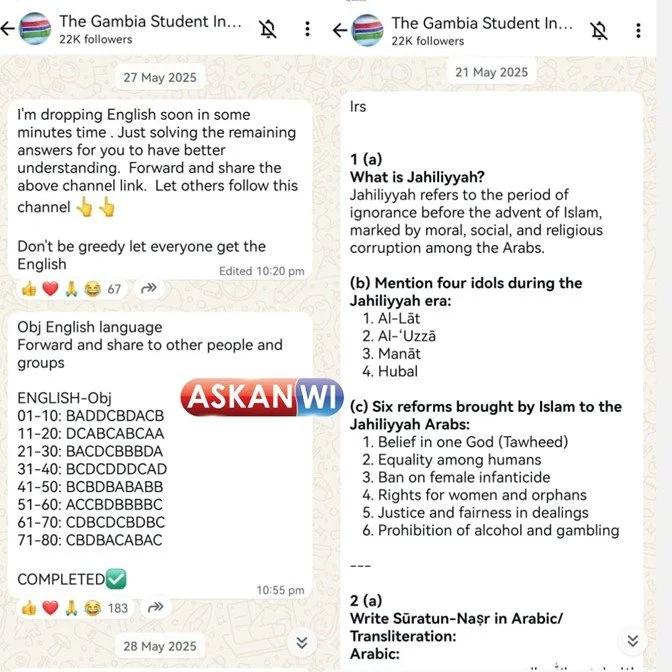Exam Fraud: Who’s at Fault? St. Augustine’s Vice Principal Speaks
Student cheating during an exam
By Edward Francis Dalliah
The Ministry of Basic and Secondary Education (MoBSE) revealed in mid-August 2025 that over 600 results have been flagged for suspected examination malpractice after the 2025 West African Senior School Certificate Examination (WASSCE).
This alarming development has sparked a debate on the integrity of the country’s examination process and who should be held accountable.
In a statement dated 12th August 2025, MoBSE announced that "the results of 631 candidates suspected of examination malpractice have been withheld," pending investigation by the West African Examinations Council (WAEC). This represents a dramatic increase from 2024, when only 28 candidates were flagged for similar offences. The sharp rise, more than 30 times higher than the previous year, suggests a systemic issue which, when not addressed, will affect the credibility of the examination council and students’ results.
A Rumour of Planned Leakage of WASSCE 2025 Examination Papers
On 24th April 2025, before exams commenced, there were online allegations claiming that a planned leakage of examination papers was already underway. In response, MoBSE and WAEC issued a joint statement warning that any such claims were “fraudulent” and aimed at undermining the credibility of the examination system.
They further assured the public that “WAEC has implemented comprehensive and robust measures across all stages of the examination process, from the secure management of test papers to the marking and processing of results, to effectively prevent the leakage of examination materials.” Despite these assurances, the reality on the ground tells a different story.
Inside the Examination Halls: Technology and Loopholes
Our reporter gained access to a WhatsApp group allegedly used to share the WASSCE 2025 exam questions and answers in real time. Group members reportedly forwarded exam content while tests were still underway, indicating that some candidates managed to smuggle phones into the examination halls, a clear breach of WAEC's rules. It is unclear to us whether those questions and answers are actually those of the 2025 question, as efforts to have access to the 2025 past question papers and answers from WAEC were unfruitful.
At the time of publishing this report WEC Officials have not responded to our queries to verify the screenshots showing exam answers being shared before and during exams
However, the fact that the group was active in real time during the exam meant that students who managed to sneak in with their phones could access those messages, raising serious concerns about the effectiveness of the exam supervision and invigilators. If students can access mobile devices and external help while seated in examination rooms, then the integrity of the entire system is at risk.
Exam questions and answers were shared on WhatsApp. Our journalist managed to gain access to one of these groups, of which there are many others. © Askanwi
Voices from Schools: Who’s to Blame?
In an interview with Askanwi, the Vice Principal of St. Augustine’s Senior Secondary School in Banjul, Mr. Michel Jatta, responded to the growing concern and pointed fingers at multiple stakeholders. He told our reporter that “the examination council should be held responsible for not finding an effective solution to the usual leakage of exam papers before exams.” In addition to this, he pointed fingers at the examination supervisors, saying they “have to be accountable for not being effective in their duties.”
“WAEC should conduct a proper check on the integrity of such people before they’re appointed. Too often, these supervisors build close, unprofessional relationships with school principals, allowing them to be easily manipulated during exams. Some exam supervisors lack proper professional ethics,” he stressed.
Delving into the invigilation system during the exams, the St. Augustine’s Vice Principal said, “The fact that school teachers themselves are tasked with invigilating the examination of their own students leaves so much room for dishonest teachers and school principals to cheat the system and aid malpractice for the sake of getting good pass rates.” These remarks highlight a critical weakness in oversight and recruitment. Moreover, it paints a picture that reveals corruption and favouritism infiltrating the system from the council to the schools.
A Systemic Issue: The Role of Corruption
An Agriculture Science teacher at Nema Kunku Radville Senior School at Nema Kunku in the West Coast Region, Mr Alahagi Njie, also weighed in on the discussion. He emphasised that corruption is a major factor contributing to examination malpractice. Mr Njie pointed out that “some educators may facilitate cheating for financial gain, undermining exam integrity.” This viewpoint reflects a deep-rooted ethical problem in the system, where supervisors, invigilators or administrators might be motivated to help students cheat in exchange for bribes or favours in return.
The Road Ahead: Accountability or Collapse?
With 631 students now facing uncertainty over their results, the consequences of malpractice are becoming more severe and far-reaching. Not only do these incidents cast a shadow over the credibility of the WASSCE, but they also undermine the trust that society places in the education system as a whole.
Both Mr Jatta and Mr Njie acknowledged that, with such activities in the system, its consequences are massive. They said it risks staining the credibility of the examination council, as well as the reputation of schools and students and devaluing their results.
Mr Jatta told Askanwi that they have “seen many students finishing high school with exceptional results but cannot perform in higher learning institutions.” Similarly, Mr Njie also believes such activities could produce “unprepared graduates”, pointing out that this results in seeing “a student who did very well in the WASSCE exam, but upon entering university or college, they will not be able to perform.”
So, as stakeholders debate on who is responsible, the need for urgent reform becomes more evident. Without meaningful changes in supervision, security, and ethics, examination malpractice will continue to threaten the future of honest students and the value of academic qualifications in The Gambia.
In 2024, it was 28, and now in 2025, it has increased by over 30 times, up to 631 candidates. Therefore, the scandal is not just about individual students trying to cheat. It reflects a larger failure in oversight, accountability, and ethics within the education system. Until these issues are addressed at their roots, the cycle of malpractice is likely to repeat and worsen in the future.


